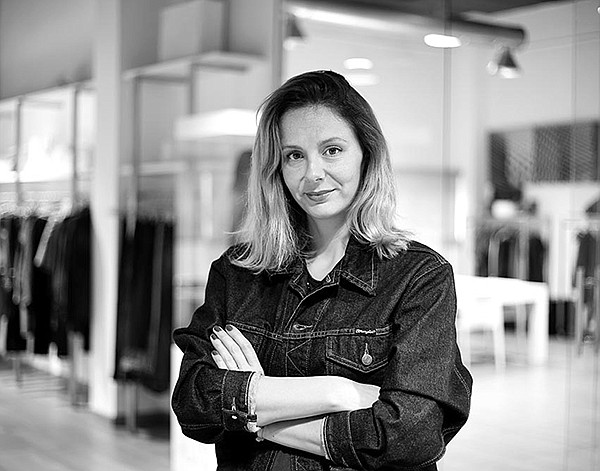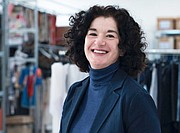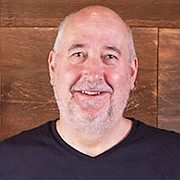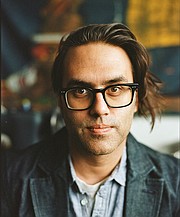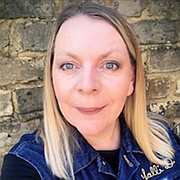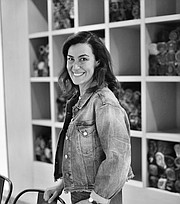TEXTILES
Carved in Blue Checks In With Its Community Two Years Into COVID
Carved in Blue®, a denim community blog by the TENCEL™ denim team from Lenzing, collected community thoughts about COVID-19 and the indelible changes it has made. The resulting Blue Lenz video series “Headspace” allowed the team to connect over a shared experience happening many miles apart.
Two years later, Carved in Blue® got in touch with Jeanologia’s Carme Santacruz Zaragozá, Lucia Rosin of Meidea, Lenzing’s Michael Kininmonth, Mohsin Sajid of Endrime, denim consultant Salli Deighton and Sinem Celik of BluProjects, all of whom took a moment to reflect on their impressions since early 2020.
Carved in Blue: When you look back on the early days of lockdowns, how would you describe your headspace? How has this changed two years later?
Carme: I remember my early lockdown days lived with fear and confusion of the unknown new situation. But at the same time I remember being united and connected to my family, friends and colleagues, despite being apart.
Lucia: I have realized during these two years that we are vulnerable, both for the general health of the people but also, and above all, for a matter of mental health. The connection between people—the contact between human beings—is fundamental for well-being. After two years I have a physical need to see and meet in person.
Michael: In our daily lives we seem to be encountering increasing complexity and decreasing control. So, it is difficult not to feel somewhat overwhelmed—a feeling that has not diminished two years on. At the same time, there is definitely a feeling of privilege in terms of being born and living in a wealthy, democratic country and working for a company that has supported its employees throughout the pandemic.
Mohsin: I was so shocked by the full stop—how it happened. I was traveling in Japan as I saw the news explode. When we got home, we went into full lockdown. I was very concerned about my family and elderly parents and how we would pay our mortgage. It was also a fast way to find out which of our clients would take care of us. In the last two years, the concerns are still the same, but I’m just thankful we have been too busy and adjusted very quickly to working from home. A few years prior we moved our studio into our home, so we were the lucky ones.
Salli: I had been working in Italy most weeks before COVID, so it felt very surreal to be grounded at home for the foreseeable future. There was a panic, getting my family safely back in the nest, and an eerie sense of the unknown ahead. I have to admit, I think I’d been heading for burnout at the pace I’d been living. I wondered if that schedule had converted into real work value, and I realized I really didn’t need to travel so much. Two years on, learning to pace myself is a challenge. It’s in my nature, and there’s always so much to learn! I try to ensure I bring real value to every given task and try to focus on what projects will really make a big difference long-term.
Sinem: I think the biggest challenge and change for me was to be okay with uncertainties. I think I’ve personally developed and now even enjoy the endless possibilities in the unknown. Another big change for me is, instead of traveling almost every week in pre-COVID life, I live continuously in a small area nearby the woods. Living in harmony with nature’s cycle has changed my perception of time and how to spend it.
Carved in Blue: What are the top things you’ve discovered—about yourself or the world around you—as a result of the pandemic?
Carme: I think that COVID-19 has shaken our way of living completely, and this new situation has made us reassess our priorities. Now we embrace technology as an ally to be more efficient in our workspaces and as a great tool to be close to our loved ones, despite the distance. Sustainability is the only option, and it is not just for the planet but also for our own well-being.
Lucia: I found that I have a lot of friends all over the world, and I look for their support and friendship. I feel like a better person despite the dramatic period we have been through—and are still going through. I also discovered that traveling is important but we can also work online if we establish relationships in person to understand each other first.
Michael: The first thing that I would say is that there can be no return to “normality,” because normality has got us where we are today. Secondly, it is difficult not to be pessimistic. However, we must counter what I would describe as “unthinking pessimism”—that is, an insistence that social problems are so beyond our control that we cannot avoid catastrophe. Thirdly, clearly the situation is serious—as witnessed by the recent sixth IPCC Assessment Report, in which the UN Secretary General António Guterres describes it as “an atlas of human suffering and a damning indictment of failed climate leadership.” Climate change is an even greater and more complex global challenge than the pandemic. By its very nature, this task requires concerted international action.
Mohsin: An I-can-do-anything attitude—I think it came out more over this period. I’ve always had a belief that I could do anything when it comes to being creative. We straight away stopped designing collections and moved into creating digital content—from webinars, podcasts and hosting events with 600-plus people, it was immensely fun. I found all of a sudden I had access to many people who were difficult to get access to pre-COVID. People’s calendars were open. We all become experts on Zoom. I actually taught hundreds of students online, and I think in some way it actually helped them. Students who sometimes are too shy to speak had 15- or 30-minute slots with me one-on-one.
Salli: I have too much denim in my house, and most of it doesn’t fit me! With samples redirected to my home and my loft office developing a bowed floor under the weight of hangers and samples, I realized how we have to work smarter. We’re sustainable, but only when it’s convenient! The “every man for himself” approach from retailers was shameful, and I felt embarrassed for my industry. We need to implement measures so this can never happen again.
Sinem: About myself—discovering new possibilities and creative solutions and what’s really essential in my life. About the world—that we are all connected.
Carved in Blue: Looking ahead, what makes you most hopeful?
Carme: I would like to think that after everything that has happened, we can learn from our mistakes. But now, after fighting the pandemic, we are fighting a war. I think that what brings hope is, precisely, that we are more empathetic and we are able to adapt to whatever happens.
Lucia: Surely young people—how much awareness they have gained, their depth of thought. The ease in the use of new technologies inspires and encourages me to learn new things that I do not know to improve myself.
Michael: How often in the last two years has it been said that the world will never be the same again after the COVID-19 pandemic? If so, how might it change? Might it not change much at all? The questions have given rise to speculative debate, with optimists and pessimists offering their predictions. One lesson from the pandemic is society’s ability to rapidly adapt to changing circumstances such as working from home, meeting online, social distancing, and large-scale financial support for vulnerable sectors and populations. Effective action against climate change will no doubt require similar resilience and an even greater capacity to innovate. Some aspects of the fight against this pandemic give reason to hope that this is possible.
Mohsin: I am hopeful that it’s more acceptable to work from home. I used to be shy and embarrassed that we had a home studio. I now know many are trying to achieve the same thing. We were the lucky ones.
Salli: We have had to think about the supply chain differently, and this has opened the gateway for new business models and better working practices. COVID times gave me the opportunity to refine business plans for a U.K. denim hub, which will support U.K. brands and retailers and enable us to work smarter, de-risk, and, most importantly, educate the next generation of designers, buyers and techs. Sustainability has accelerated with consumers. When people can’t shop for a few months, they start to think about fashion in a much healthier way. Also, we have all learned to do our jobs better. We all Zoomed and learned so many new things. Lockdown was kind to me, and I emerged with a greater network of denim friends and connections who share a united passion to learn and drive positive change.
Sinem: Gen Z, including my daughter, is here to question, act to improve and transform everything we know. A quote I repeat a lot lately is: “I can shake the world in a very gentle way.”
This report has been lightly edited for space.
Get connected at https://carvedinblue.tencel.com
